| There needs to be a balance and integration between the heavenly yang therapies such as Qi-healing, Qigong and acupuncture with the earthly yin aspect such as diet and tonic superior herbs which together create harmony, healing wholeness of yin and yang and spiritual oneness with the universe to truely envision what Taoist master Chuang Tzu said, "There is nothing which heaven does not cover, yet nothing that earth does not sustain."
Tonic herbs are herbs which promote a long, healthy, vibrant, happy life without any unwanted side effects even when taken over a long period of time. The tonic or Superior Herbs, essentially, are empowering and healthful "super-foods" which benefit our well being in ways that more common foods cannot. And they have a protective, balancing, vitalizing quality beyond that of any other herbs. They are generally consumed as a herbal supplement to a well balanced healthy diet for the purpose of optimizing our nutritional needs. See Ricardo's Story
Applying the principle of the Three Treasures is the highest form of great herbalism. (See Three Treasures) In the Orient it is called "the Superior Herbalism." Six tonic or superior herbs revered by the great sages as the quintessential substances to cultivate the Three Treasures (Qi, Shen, and Jing) are Reishi mushrooms, Ginseng, Schizandra fruit (Wu Wei Zi), Asparagus Root (Tian Men Dong), Gynostemma Pentaphyllum (Jiao Gu Lan), and Rhodiola (Hong Jing Tian). Before we describe their herbal properties, Shen Nong Ben Cao (Divine Farmer's Materia Medica) and Huang Di Neijing (Yellow Emperor's Classic of Medicine) described them as superior or immortal foods as opposed to the medicinal and radical herbs:
| Huang Di asked, "Can you tell me about the three grades of herbs that were recorded in the Shen Nong Ben Cao (Shen Nong's Materia Medica)?"
Qi Bo replied, "In ancient times the art of herbology was practiced by categorizing all herbs into three classifications. The first category of herbs was called superior, or immortal foods because of their lack of side effects and strengthening qualities. These were often incorporated into one's diet and were used as preventive measures. The second category of herbs was called medium or medicinal and were used to rectifying imbalances in the human body. These were used until the patient recovered from their illness and then withdrawn. The third category of herbs was called inferior or radical herbs, so named because they are strong in action and not without side effects; sometimes they are toxic. Therefore these were used often in small amounts and once the desired action took place they were discontinued immediately.
"The paramount mission in healing is to dispel the pathogen and strengthen the patient." |
The first superior class section of 6 herbs listed in the Shen Nong Ben Cao Jing which have been left out of the mainstream of TCM training and practice are none other than six different colors of Ling Zhi (Ganoderma), commonly known as Reishi Mushroom. These six varieties of Reishi are related to the 5 elements. Green, Red, Yellow, White, Black, and are related to Wood, Fire, Earth, Metal, and Water, while the 6th Reishi, Purple, zi zhi, is not explained clearly. Since Purple Rieshi is rather difficult to find, this is a truly sublime substance which was used in Taoist practices to open the heart, and could be categorized under the fire element. See Red Reishi - How An Ancient Herbal Treasure Can Benefit Your Health Today Book (PDF)
In its description of almost all the superior quintessential substances to cultivate shen, qi and jing, especially Reishi, the Ben Cao describes the substances in this way:
"Protracted taking may make the body light, prevent senility, and prolong life so as to make one an immortal."
Reishi Mushroom
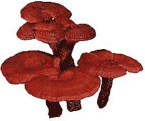 The Reishi mushroom, also known by its formal name of Ganoderma and its Chinese name Ling Zhi, has attained an unparalleled reputation in the Orient as the ultimate herbal substance. For over three thousand years it has been the most sought-after product of nature by mountain sages and by the emperors and empresses of all Eastern nations. In the first Chinese herbal text (Shen Nong's Pharmacopeia) written about 2400 years ago, Reishi was classified as a "superior herb" which is defined as one that "serves to maintain life, promote radiant health and long life because of its normalizing action, and to cause no side effects, even when used continuously." That ancient book said that "continuous consumption of Reishi makes your body light and young, lengthens your life and turns you into one like the immortal who never dies." Thus Reishi was traditionally called "the mushroom of immortality." The Reishi mushroom, also known by its formal name of Ganoderma and its Chinese name Ling Zhi, has attained an unparalleled reputation in the Orient as the ultimate herbal substance. For over three thousand years it has been the most sought-after product of nature by mountain sages and by the emperors and empresses of all Eastern nations. In the first Chinese herbal text (Shen Nong's Pharmacopeia) written about 2400 years ago, Reishi was classified as a "superior herb" which is defined as one that "serves to maintain life, promote radiant health and long life because of its normalizing action, and to cause no side effects, even when used continuously." That ancient book said that "continuous consumption of Reishi makes your body light and young, lengthens your life and turns you into one like the immortal who never dies." Thus Reishi was traditionally called "the mushroom of immortality."
The Reishi Mushroom grows wild only upon old trees and roots of certain types of trees in remote mountain forests of China, Japan and Korea. Only in the fifteen years have we seen the cultivation of Reishi, and thus the commercial availability of this amazing health product. Reishi has been the object of intensive scientific studies to discern its many health functions from a modern perspective. Traditionally, Reishi is believed to be a tonic to all of the body's energies. It was revered as a major tonic to each of the three Treasures, Jing, Qi and Shen.
As a Jing (Essence) tonic, Reishi is believed to have major life lengthening effects when consumed over a long period of time. It is believed to build primal power and to replenish energy spent handling stressful situations.
As a Qi (Vitality) tonic, Reishi is used to build energy, although it is slightly sedative in the short run. It is most famous as an herb used to build the immune system. Many studies done in Japan have shown Reishi to have a powerful effect on the body's overall resistance to disease. Reishi is believed by Japanese and Chinese researchers to have a regulatory effect on the immune system, bringing up immune functions in cases of immunodeficiency and reducing the excesses associated with auto-immune conditions. Reishi is a superb tonic for people who suffer from chronic allergies. Reishi is also believed to have major benefits on the lungs and liver. Studies done in Japan have shown that Reishi protects the liver from damage due to toxic chemicals, including pharmaceutical metabolites. Furthermore, studies done in Japan and elsewhere have also demonstrated that Reishi is beneficial to the cardiovascular system, since it appears to help regulate coronary and cerebral blood flow and also seems to help reduce levels of blood lipids and in lowering elevated cholesterol.
As a Shen (Spirit) tonic, nothing compares to Reishi. It is simply the greatest Shen tonic of them all. It is believed by the Chinese to protect the Spirit and to nurture the growth of intelligence, wisdom and spiritual insight. Reishi is a superb anti-stress herb. Everyone who takes Reishi notices the peacefulness that seems to accompany its use. Many people are able to stop using chemical drugs. And Reishi seems to be cumulative, gradually strengthening the nerves and actually changing how we perceive life. It has routinely been used by mountain hermits, monks, Daoist adepts and spiritual seekers throughout Asia because it was believed to help calm the mind, ease tension, strengthen the nerves, improve memory, sharpen concentration and focus, build will power and, as a result, help build wisdom. That is why it was called the "Mushroom of Spiritual Potency" by these seekers. The people of Asia believe more than ever in Reishi's power to improve the quality of life by improving the inner life of a human being. All the scientific validation only explains the physical nature of Reishi, but it is the profound ability of Reishi to improve one's life on every plane that makes it so incredible.
Studies done in Asia indicate that Reishi is a supreme health food supplement that has virtually no toxicity or side effects.
There are many Reishi products coming to the market at this time, but very few are truly excellent. Reishi must be extracted to be digestible and assimilable. Unfortunately, most Reishi products are not extracted and most are made from inferior quality hot house mushrooms or use inferior cultivated Ganoderma mycelium.
Other Common Names
Reishi mushroom,
Ling Zhi, Ganoderma
Pharmaceutical Latin
Ganoderma
Pinyin
Ling Zhi
| Treasures
Jing, Qi and Shen
Atmospheric Energy
Neutral or slightly warm
Organ Meridian Systems
Heart, Liver, Lungs, Kidney
Part Used and Form
Fruiting body, spores, mycelium
|
Primary Functions
Nourishing tonic, tonic to the three treasures (Jing, Qi and Shen), builds body resistance, detoxifying, aphrodisiac, sedative, prolongs life and enhances intelligence and wisdom
Qualities
Ganoderma is arguably the most revered herbal substance in Asia, certainly ranking with ginseng as the elite substance for the attainment of radiant health, longevity and spiritual attainment. It has maintained that position for at least 2000 years, and its reputation and value are only increasing. Numerous legends provide a rich and extensive record of Ganoderma in Asian society.
Reishi has traditionally been used as an anti-aging herb and has been used for many diseases and disorders as well. It has long been a favorite tonic food supplement by the Chinese Royal family and virtually any one who could obtain it. Ganoderma was particularly revered by the followers of the Taoist tradition as the "Elixir of Immortality." Taoists have continuously claimed that Reishi promotes calmness, centeredness, balance, inner awareness and inner strength. They have used it to improve meditative practices and to protect the body, mind and spirit so that the adept could attain both a long and healthy life and spiritual immortality. Due to its rarity, the common people could rarely obtain a Reishi mushroom, but it was popularly revered as a greater treasure than any jewel.
Since Reishi has been known to have many functions, it has been the subject of a great deal of research in recent years. It is absolutely safe, being non-toxic. It ranks in Asia with Ginseng, Deer Antler, Astragalus and Cordyceps as a pre-eminent tool in the attainment of radiant health.
Its health benefits of Reishi are extremely broad and it is virtually non-toxic. Though it is now used much like ginseng, Eleutherococcus and Astragalus as a general tonic to help develop energy, to improve digestion and to improve sleep, scientists are exploring its potential in their terms
Ganoderma is a profound immune potentiator. It has been found to significantly improve the functioning of the immune system whether the immune system is deficient or excessive. In this sense, it is an immune "modulator" --- that is, it helps to modulate, or regulate, and fine tune the immune system. Our immune system is a virtually miraculous network of activities designed over millions of years to protect us from viruses, bacteria, parasites, molds, dust, pollen and malignant cells. It is the responsibility of the immune system to detect the intrusion, or invasion, of these entities and to mount a defense in order to eliminate them. A healthy immune system is capable of resisting most such intruders and a very hardy system may be able to resist invasions that many other people's systems cannot. If the immune system is weakened or malfunctioning, the invading microbes can easily establish a foothold in our body and disease sets in. Antibiotics can often be used to stop the invasion at this time, but chronic use of antibiotics further weakens the immune response. Furthermore, antibiotics are useless against viruses, pollens and most parasites. They are certainly useless against malignant (cancerous) cells generated in our own bodies. It is much better to resist the invasion from within with a fully fortified immune system and not become ill in the first place. This is where herbs like Reishi our now attracting the attention of scientists and consumers alike.
Many chemical constituents play a role in GL's immune modulating capacity. The polysaccharide components in particular seems to play an important role in attacking cancerous cells, but not healthy ones, while simultaneously strengthening the body's overall immune functions. The polysaccharides appear to help the body attack microbial invaders such as viruses, bacteria and yeast.
But Reishi does not just "stimulate" the immune system. It regulates it. And that is what makes Reishi so precious. If the immune system is excessive, as is the case with auto-immune diseases and allergies, Reishi can have significant positive influence. A group of chemicals known as the ganoderic acids help fight auto-immune diseases such as allergies. Ganoderic acids inhibit histamine release, improve oxygen utilization and improve liver functions. Ganoderic acids are also potent antioxidant free-radical scavengers.
Still another component, Beta-1, 3-glucan, helps regulate and stabilize blood sugar levels. Not only that, but these same components have been shown to have powerful anti-tumor properties.
Reishi is widely used in Asia to improve the cardiovascular system. It helps lower HDL (the "bad" cholesterol) and reduce excess fatty acids. It has been found to prevent and treat hardening of the arteries, angina and shortness of breath associated with coronary heart disease.
In 1977 it was discovered in Japan that Reishi had potent anti-cancer activity. It was first used to treat, and quite successfully, hairy-cell leukemia, which is caused by a retrovirus closely related to HIV, the virus that causes AIDS. It has been an approved drug for cancer in Japan since that time and has been used safely and effectively, often in conjunction with other drugs or radiation. It has been demonstrated that Reishi can help reduce the side-effects of many kinds of chemotherapy and radiation treatment and simultaneously contribute to the rebuilding of the immune system---an essential part of the recovery from cancer. Ganoderma stimulates the production of interferon and interleukins I and II, all being potent natural anti-cancer substances produced in our own bodies. Reishi may well prove to be the greatest prevention against cancer because it helps us to protect ourselves by our own power.
It has also been approved in Japan and China for the treatment of myasthenia gravis, a serious auto-immune disease. Besides that, it is commonly prescribed by MD.'s in Japan for chronic bronchitis, memory loss, insomnia, hyperlipidemia and a whole range of degenerative diseases of the elderly, including disorders associated with senility.
Reishi is a superb anti-stress herb. Throughout history it has been used to bring balance into the lives of people who needed help in this department, and that means most everyone. Deep in antiquity, it was routinely used by mountain hermits, monks, Taoist adepts and spiritual seekers throughout Asia because it was believed to help calm the mind, ease tension, strengthen the nerves, strengthen memory, sharpen concentration, improve focus, build will power and, as a result, help build wisdom. That is why it was called the "Mushroom of Spiritual Potency" by these seekers. The people of Asia have never lost their faith in Reishi. They believe more than ever in Reishi's power to improve the quality of life by improving the inner life of a human being. All the scientific validation only explains the physical nature of Reishi, but it is the profound ability of Reishi to improve one's life on every plane that makes it so miraculous. Reishi is indeed calming and centering. Everyone who takes Reishi notices the peacefulness that seems to accompany its use. Many people are able to stop using chemical drugs. And Reishi seems to be cumulative, gradually strengthening the nerves and actually changing how we perceive life.
Reishi is a substance that builds health on all levels. It is the rarest of jewels in Nature. Life itself is based on the ability to adapt to the stresses, the attacks, the challenges that come our way every day. Reishi seems to provide an incredible resource of the full range of energies we need to meet these challenges. Reishi is indeed "the great protector," protecting us on every level -- physically, immunologically, mentally, spiritually. It helps us adapt to the world and provides additional power for us to achieve a superior level of life. When we are so protected and so provided for, we can achieve things that otherwise would be impossible. That is why Reishi has been called the "herb of good fortune."
Panax Ginseng
 One of the most famous and valued herbs used by mankind, Asian Ginseng is an energy tonic that regulates the human energy system. It has been shown to be stimulating and regulatory to both the central nervous system and to the endocrine system. It is the primary Qi tonic of Chinese tonic herbalism. One of the most famous and valued herbs used by mankind, Asian Ginseng is an energy tonic that regulates the human energy system. It has been shown to be stimulating and regulatory to both the central nervous system and to the endocrine system. It is the primary Qi tonic of Chinese tonic herbalism.
Ginseng helps a person to adapt to all kinds of stresses, and enhances endurance and resilience under stressful conditions. It has thus been termed an "adaptogenic" substance by scientific researchers. Ginseng is also used to tonify digestive and respiratory functions. In Chinese health practice, there is a theory of Li Qi, which literally means balance of energy. It is a term often used to describe the ability of Ginseng to balance the system at a fundamental level. In modern terms, this concept refers to the ability of Ginseng to help regulate body functions, or to strengthen the functions that regulate other body functions. On the basis of its pharmacological properties, Ginseng has been classified as and adaptogen.
Ginseng contains many active ingredients, but the most important are the saponins called ginsenosides. Ginsenosides specifically improve adaptability and are believed to help build muscle and endurance. Therefore Ginseng is very popular with athletes. Asian Ginseng generally has a "warm" energy.
Ginseng increases physical and mental efficiency, and has been shown to improve the accuracy of work by promoting concentration. Ginseng prevents overfatigue. High quality Ginseng is not a stimulant like amphetamines or caffeine, and it does not create nervousness or disturb sleep, yet it increases alertness.
Ginseng is used by Chinese traditional doctors as a tonic for general weakness, poor appetite, low sex drive, shortness of breath, cold limbs, spontaneous sweating and premature aging.
Ginseng is a superb herb for aged people. It has a mental stimulant effect in elderly persons and it improves memory and cognitive power, and can often reverse intellectual and mental deterioration. It quickens thinking and improves physical energy, often to a startling degree. Ginseng is very effective in hastening the recovery from illness and surgery.
There are in fact many varieties of Ginseng, all of which have distinct characteristics. Most high quality ginseng is good for men and women alike. Wild and semi-wild Ginseng is generally far superior to the cultivated, commercial varieties. The higher the quality, the more Shen (Spirit) a ginseng root is said to contain. There are also a number of superb sources of cultivated Ginseng, which have long traditions of excellence.
Generally, Ginseng is used with other herbs. However, Ginseng is often used by itself or with just one or two other herbs. Several varieties of Ginseng may be blended to create remarkable adaptogenic formulations.
Other Common Names
Ginseng Root
Pharmaceutical Latin
Panax Ginseng
Pinyin
Ren Shen
Treasures
Qi, Shen and Jing
|
Atmospheric Energy
Slightly Warm
Taste
Sweet, Slightly Bitter,
Organ Meridian Systems
Spleen and Lungs
Part Used and Form
Root (leaves are sometimes used as a tea)
|
Primary Functions
Tonify Qi, Adaptogenic, immune modulator, prolong life, overcome fatigue, increase blood volume, aid in recovery from illness or trauma, sharpen and calm the mind, stabilize the emotions, counteract stress and enhance wisdom
Qualities
On the basis of its pharmacological properties, Ginseng has been classified as and adaptogen. It is a powerful anti-stress agent. In Chinese health practice, there is a theory of Li Qi, which literally means balance of energy. It is a term often used to describe the ability of Ginseng to balance the system at a fundamental level. In modern terms, this concept refers to the ability of Ginseng to help regulate body functions, or to strengthen the functions that regulate other body functions.
Ginseng is used by Chinese traditional doctors as a tonic for general weakness, poor appetite, low sex drive, shortness of breath, cold limbs, spontaneous sweating and premature aging. Generally, Ginseng is used with other herbs. However, Ginseng is often used by itself or with just one or two other herbs.
Ginseng increases physical and mental efficiency, and has been shown to improve the accuracy of work by promoting concentration. Ginseng prevents overfatigue. Ginseng is not a stimulant like amphetamines or caffeine, yet it increases alertness. However, it does not provoke subjective excitation (nervousness) nor does it disturb sleep. It is, in fact, used in a great many sleep-aid formulations. In China, there is an almost universal practice by high school and college students to consume Ginseng during examination periods. The practice is generally to chew several pieces a day while preparing for examinations and to chew Ginseng constantly during the examination period. Students claim that it makes them more alert, helps them stay awake for days on end with little sleep and improves memory and reasoning ability.
This great herb has a mental stimulant effect in elderly persons. It improves memory and cognitive power and can often reverse intellectual and mental deterioration. It quickens thinking and improves physical energy, often to a startling degree. Ginseng is very effective in hastening the recovery from illness and surgery. Ginseng is a superb herb for aged people.
The tonic benefits of Ginseng are long lasting. When Ginseng is taken for an extended period of time, the physiological changes that take place as a result of the Ginseng last for a long period of time after the Ginseng is discontinued (if it is discontinued). Studies indicate, for example, that increased work efficiency is retained from one to two months after a one month course of Ginseng administration. People who take Ginseng to help regulate their blood sugar level will maintain normal blood sugar for several weeks after they discontinue Ginseng.
Many people claim that Ginseng has powerful aphrodisiac effects. The reputation as a sex tonic goes back to very ancient times. To this day, Ginseng maintains a reputation in this regard. I have known many men and women who have used Ginseng either for a short time or over long periods of time who claim that their sex lives improved noticeably after using Ginseng. Red Ginseng is most highly revered for its sex-stimulating qualities. Korean Ginseng in particular has a reputation for this. Ginseng certainly can help to improve sexual function by making both men and women stronger and more athletic. It improves endurance and muscular strength. By improving respiratory functions, sexual intercourse can be significantly lengthened. Sex is not merely a function of the gonads. The whole body must be healthy to enjoy sex to its fullest. However, Ginseng is believed to have gonadal effects as well. Men and women alike claim that Ginseng increases the urge for sex and intensifies sexual response.
Schizandra
 The very name of Schizandra in Chinese tells us a great deal about the qualities of this herb. Wu Wei Zi means "Five Taste Fruit." Due to the fact that Schizandra possesses all five of the classical "tastes" (sour, bitter, sweet, spicy and salty) and thus possesses the essence of all five of the elemental energies (wood, fire, earth, metal and water), Schizandra is respected as a health-providing tonic in the same class with Ginseng and Ganoderma. The very name of Schizandra in Chinese tells us a great deal about the qualities of this herb. Wu Wei Zi means "Five Taste Fruit." Due to the fact that Schizandra possesses all five of the classical "tastes" (sour, bitter, sweet, spicy and salty) and thus possesses the essence of all five of the elemental energies (wood, fire, earth, metal and water), Schizandra is respected as a health-providing tonic in the same class with Ginseng and Ganoderma.
Schizandra has been used since the dawn of Chinese civilization as a tonic herb. From the beginning it has been revered, and remains one of the elite herbs of the Chinese system of herbalism. It was first written about in Shen Nong's Pharmacopoeia, where it was listed as a Superior herb. Ancient people considered Schizandra to be the quintessence of tonic herbs and the master of the five elements. Numerous stories and documents express that taking it often would help a person recover their youthful vigor and prolong their life.
Schizandra was very popular with the emperors of China because it was believed that Schizandra added to sexual stamina, and since Chinese emperors always had many concubines, this was considered a primary asset. Chinese women historically held it in very high favor as well, especially the women of the imperial court, because of its beauty enhancing qualities. Taoists appreciated it because it was the quintessence of herbs helping to develop their spiritual power. Common people used it to promote vigor and alertness.
Asparagus Root
Wild Asparagus root is a marvelous Shen tonic and Yin tonic. It was credited by Chinese wise men as being able to open the heart, prolong life, and also to tonify the sexual functions of both men and women. It is traditionally used in Chinese herbalism as a major lung tonic. Prolonged consumption will make the skin soft, supple and smooth. In the art of radiant health, this kind of skin is a sure sign of attainment. Beautiful skin is the result of pure blood and healthy lungs. Asparagus root is useful for those who are experiencing dry skin due to a dry environment or due to internal dryness.
Thank You Note: The above information on the herbal properties of Reishi Mushroom, Panax Ginseng, Schizandra and Asparagus were taken from Ron Teeguarden's book Radiant Health, the Ancient Wisdom of the Chinese Tonic Herbs.
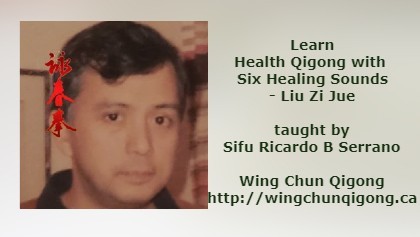
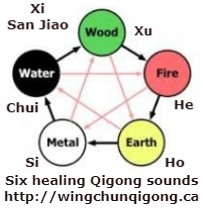
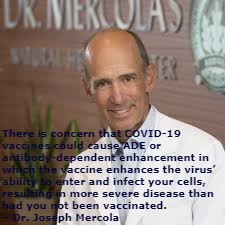

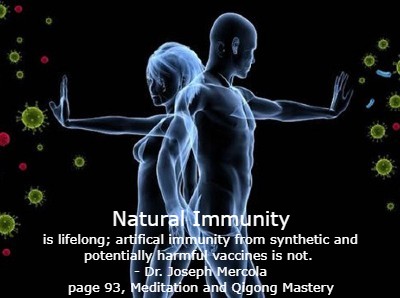
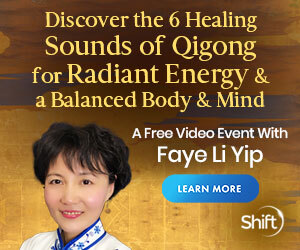

See TCM and sexual dysfunction and Can CBD help with COVID-19 Cytokine Storm?
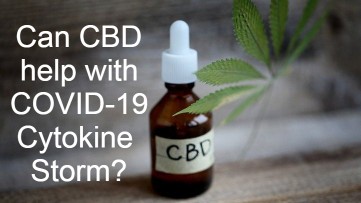
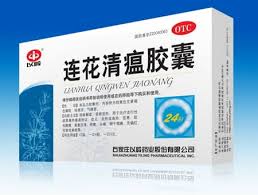
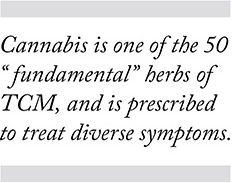
For more information, view History of Chinese Herbal Medicine by Guangyao Wang (PDF)
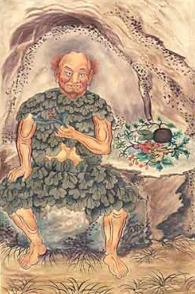
Shen Nong (Divine Farmer)
See Cultivating Qi in the Hara and Its Energetic Pathways (2) and Three Treasures Jing, Qi and Shen
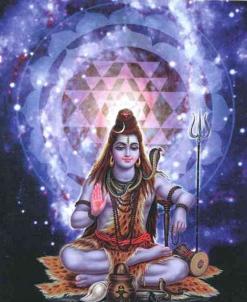
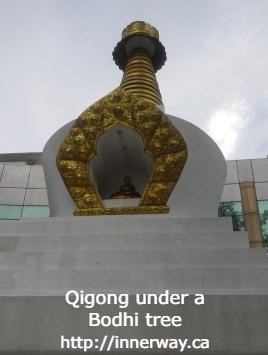
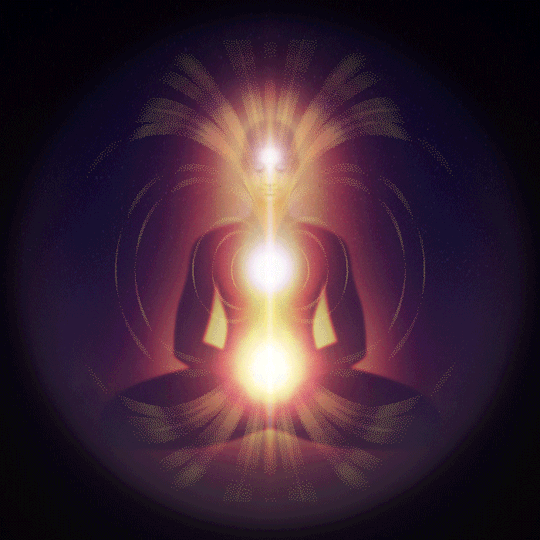
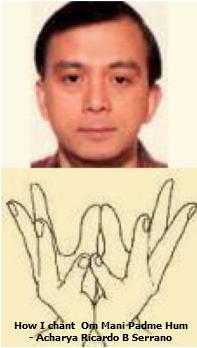

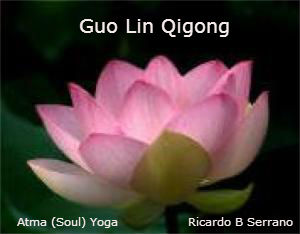
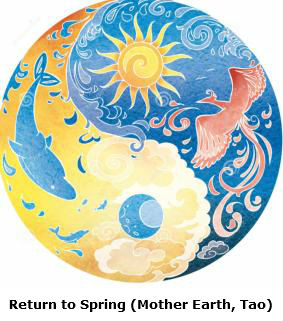
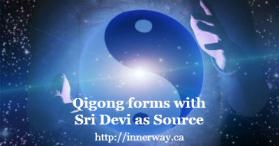
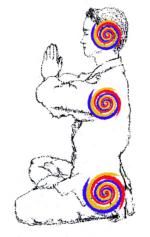
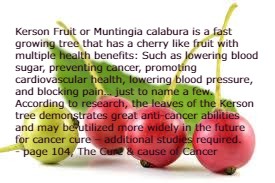

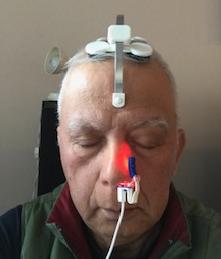
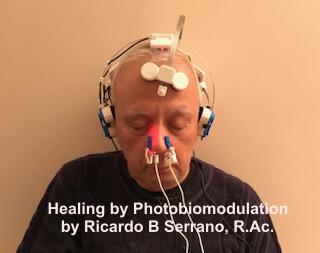
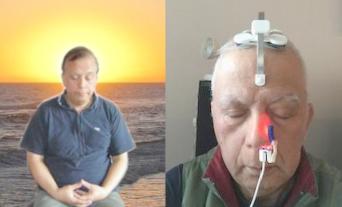
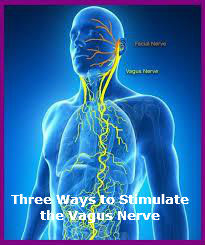
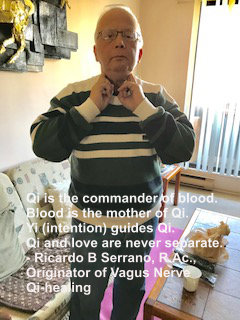

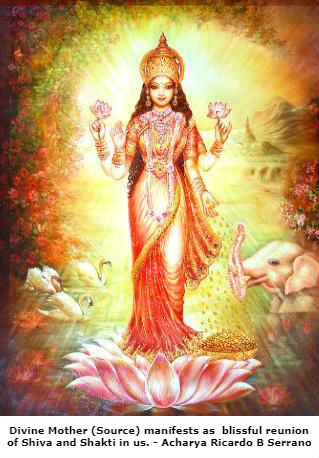
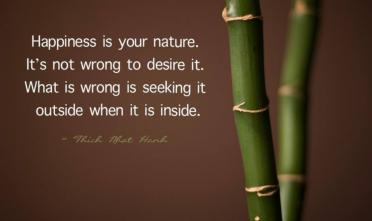





The reference ebook for Qigong Mastery (Inner Way)


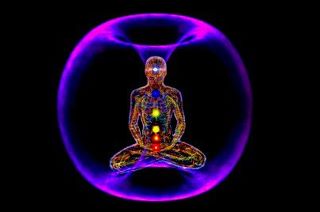 |